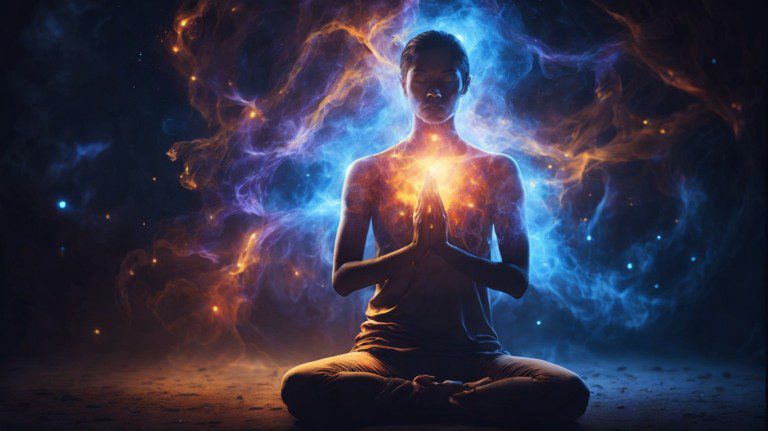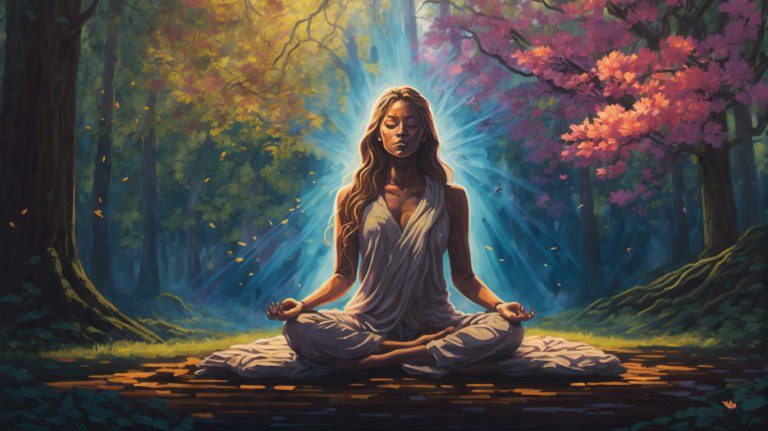Define Spirituality: Unveiling the Hidden Path to Inner Harmony
Do you ever find yourself questioning the meaning of life, yearning for a deeper connection to something greater than yourself? Well, look no further.
In this article, we will explore the concept and help you define spirituality and how it can bring enlightenment and fulfillment into your existence.
Some may argue that spirituality is nothing more than a figment of imagination, but I assure you, it is a powerful force that can unlock your true potential and set you free.
So, let’s dive in and discover the transformative power of spirituality together.
Key Takeaways
- Spirituality is a personal journey that goes beyond religious and philosophical beliefs.
- Exploring different perspectives on spirituality broadens horizons and challenges preconceived notions.
- Recognizing the interconnectedness of all spiritual paths helps foster a more authentic spiritual experience.
- Questioning and reflecting upon beliefs leads to a deeper understanding of spirituality.
Understanding the Concepts to Define Spirituality
You can gain a deeper understanding of spirituality by exploring different religious and philosophical beliefs.
Spirituality is not confined to any one religion or belief system; it is a personal journey that transcends boundaries.
By opening your mind to different perspectives, you allow yourself to see the interconnectedness of all spiritual paths.
Each belief system offers unique insights and teachings that can influence your own understanding of spirituality.
Exploring these diverse perspectives allows you to broaden your horizons and challenge preconceived notions.
It helps you recognize the common threads that unite us all, fostering a sense of connection with something greater than ourselves.
This exploration also enables you to question and reflect upon your own beliefs, leading to a more authentic and meaningful spiritual experience.
Transitioning into the subsequent section about ‘the different perspectives on spirituality’, it becomes clear that no single perspective holds the ultimate truth.
The Different Perspectives on Spirituality
When it comes to spirituality, you may find yourself contemplating the balance between personal and collective experiences.
Exploring how spirituality intertwines with religion allows for a deeper understanding of one’s beliefs and practices.
Additionally, delving into the role of meditation and its connection to spirituality can offer profound insights into self-discovery and inner peace.
Personal Vs. Collective Spirituality
There’s a difference between personal and collective spirituality.
Personal spirituality is about your individual spiritual practices, the rituals, and beliefs that resonate with your soul.
It’s the journey you embark on to connect with something greater than yourself.
On the other hand, collective spirituality involves community spiritual practices, where individuals come together to explore their shared beliefs and find solace in each other’s presence.
Both forms of spirituality have their merits and challenges.
While personal spirituality allows for deep introspection and self-discovery, collective spirituality provides a sense of belonging and support.
However, finding balance in spirituality can be tricky. It requires navigating between your own needs for solitude and reflection, while also engaging with others in a meaningful way.
The challenge lies in maintaining your personal spiritual practice while being an active participant in the collective spiritual experience.
It is a delicate dance that requires self-awareness, open-mindedness, and flexibility to adapt to different situations.
Spirituality and Religion
Joining a religious community can provide you with a sense of belonging and shared beliefs.
It offers an opportunity to connect with others who are on a similar spiritual path, seeking answers to life’s deepest questions.
In the modern world, spirituality often gets intertwined with religion, but it is important to recognize that they are not synonymous.
Spirituality transcends traditional religious boundaries and can be experienced in various ways. It is deeply personal and can coexist with scientific understanding.
The impact of spirituality on society cannot be underestimated, as it fosters compassion, empathy, and a greater sense of purpose.
Debunking myths about spirituality is essential for its growth and acceptance in the mainstream.
The Role of Meditation
To fully experience the benefits of meditation, you can start by setting aside a few minutes each day to focus on your breath and quiet the mind.
In this fast-paced world, where distractions are constant and stress is prevalent, meditation offers a sanctuary for inner peace and self-discovery.
Through simple techniques like mindfulness and guided visualization, you can learn to train your mind to be present in the moment and let go of worries.
Incorporating meditation into your daily routine allows you to cultivate a calm state of being amidst chaos.
Whether it’s exploring different types of meditation such as mantra or loving-kindness, or using meditation for stress relief and relaxation, this practice empowers you with the freedom to find solace within yourself.
Exploring Universal Truths
As you delve deeper into the practice of meditation, you begin to unravel the layers of your consciousness.
You find yourself on a journey, seeking enlightenment and embracing a higher purpose in life.
This exploration of universal truths is not just an intellectual pursuit but also a deeply spiritual one.
It is about finding inner peace and connecting with the divine within yourself and everything around you.
In this quest for understanding, you come across profound insights that shape your perspective on life. Here are some key aspects that may resonate with you:
- The interconnectedness of all beings: You realize that we are all part of a larger whole, connected by an invisible thread.
- The impermanence of existence: Everything in life is transient, reminding us to cherish each moment.
- The power of compassion: Cultivating empathy and kindness towards others brings immense joy and fulfillment.
- The potential for limitless growth: By expanding our consciousness, we can tap into our true potential.
By exploring these universal truths, you embark on a path towards spirituality and well-being.
Now let’s explore how spirituality intertwines with our overall well-being.
Spirituality and Well-Being
Now, let’s delve into how spirituality and well-being are intricately connected.
Spiritual practices offer a pathway to inner peace and a deeper understanding of oneself.
They allow us to explore the mind-body connection and find harmony within ourselves.
Through spiritual practices, we embark on a journey of self-discovery, uncovering our true essence and purpose in life.
When we engage in spiritual practices such as meditation, prayer, or mindfulness, we create space for introspection and reflection.
These practices help us cultivate a sense of inner peace by quieting the noise of the external world and connecting with our inner selves.
In finding this inner peace, we begin to understand the profound interplay between our physical bodies and our spiritual selves.
We realize that nurturing both aspects is essential for overall well-being.
As we continue on this path of self-discovery through spirituality, we open ourselves up to personal growth and transformation.
The role of spirituality becomes instrumental in guiding us toward becoming the best version of ourselves.
Transitioning into the subsequent section about ‘the role of spirituality in personal growth’, let’s explore how embracing spirituality can lead to profound transformations in all aspects of our lives.
The Role of Spirituality in Personal Growth
Spirituality plays a significant role in our personal growth and development.
It is through spirituality that we can tap into the power of mindfulness, allowing us to be fully present and aware in each moment.
This practice helps us cultivate inner peace, as we learn to let go of the past and future and focus on the now.
Spirituality also guides us toward finding purpose in our lives, helping us uncover our true passions and values.
It encourages us to embrace vulnerability, for it is through vulnerability that we can truly connect with ourselves and others on a deeper level.
And finally, spirituality reminds us of the importance of connecting with nature, rekindling our sense of awe and wonder for the world around us.
How Spirituality Influences Mental Health
To truly understand how spirituality influences your mental health, it is important to explore the ways in which it nurtures a sense of purpose and connection in your life.
Spirituality can be a powerful tool for stress management, providing you with coping mechanisms that allow you to navigate life’s challenges with grace and resilience.
By engaging in self-reflection through spiritual practices, you are able to gain insight into your thoughts, emotions, and behaviors, leading to greater emotional resilience.
Moreover, spirituality encourages mindfulness practices that help you stay present in the moment and cultivate a deep awareness of yourself and the world around you.
This heightened level of consciousness allows you to find peace amidst chaos and maintain a sense of serenity even during difficult times.
Embracing spirituality not only nourishes your soul but also strengthens your mental well-being by fostering inner calmness and promoting holistic healing.
The Connection Between Spirituality and Physical Well-being
In exploring the connection between spirituality and physical well-being, it is crucial to recognize the profound impact that spiritual practices can have on our overall health.
Spirituality goes beyond religious affiliations and taps into a deeper understanding of the mind-body connection. Here are some key insights:
- Holistic Approach: Incorporating spirituality into healthcare allows for a more comprehensive approach to healing, acknowledging that physical health cannot be separated from mental, emotional, and spiritual well-being.
- Mind-Body Connection: Spiritual practices such as meditation, prayer, or mindfulness can positively influence our physiology by reducing stress, boosting immune function, and promoting relaxation.
- Faith in Healing: Faith plays a significant role in physical healing. Believing in a higher power or having faith in the process of recovery can enhance resilience and contribute to positive outcomes.
- Improved Quality of Life: By nurturing our spiritual selves, we experience increased feelings of meaning, purpose, hope, and peace – all factors that contribute to overall well-being.
Practical Tips to Enhance Your Spiritual Journey
By incorporating simple practices like daily meditation or journaling into your routine, you can enhance your spiritual journey and deepen your connection with yourself.
Mindful practices invite you to be fully present in the moment, allowing you to tap into the wisdom of your inner being.
Connecting with nature is a powerful way to restore balance and find solace amidst the chaos of everyday life.
Take a walk in the woods or sit by a serene lake, and feel the peace that nature offers.
Cultivating gratitude opens up your heart and helps you appreciate the abundance in your life. Finding inner peace requires letting go of attachments and embracing acceptance.
When you practice self-reflection, you gain insight into your thoughts, emotions, and actions, enabling personal growth and transformation on your spiritual path.
Embrace these practices as gateways to freedom, liberation from external circumstances, and ultimately a deeper understanding of yourself.
Frequently Asked Questions
How Does Spirituality Differ From Religion?
Spirituality differs from religion by focusing on personal spiritual practices, the role of faith in one’s life, the concept of a higher power, and individual interpretation of rituals and ceremonies. It also encompasses beliefs in an afterlife.
Can Someone Be Spiritual Without Being Religious?
You don’t need religion to be spiritual. It’s about your personal beliefs, finding mindfulness in the present moment, self-discovery, connecting with a community of like-minded individuals, and experiencing personal growth. Embrace the freedom to explore spirituality on your own terms.
Is Spirituality a Personal Experience or Can It Be Defined Universally?
Is spirituality a personal experience or can it be defined universally? Cultural perspectives, philosophical interpretations, historical context, personal beliefs, and societal implications all shape our understanding of spirituality. It is both deeply personal and influenced by external factors.
How Can One Incorporate Spirituality Into Their Daily Life?
Incorporate spirituality into your daily life by practicing mindfulness, meditation, and gratitude. These techniques cultivate a spiritual mindset and bring numerous benefits like inner peace and clarity. Balance spirituality with other aspects of life for a holistic approach to well-being.
Are There Any Scientific Studies That Support the Benefits of Spirituality on Overall Well-Being?
You’ll be glad to know that scientific studies support the benefits of spirituality. It can strengthen your mind-body connection, reduce stress, improve mental health, enhance your sense of purpose, and boost resilience.
Conclusion
Congratulations on completing this article about spirituality!
You have delved into the depths of this concept, exploring its different perspectives and understanding its role in personal growth.
By uncovering the influence of spirituality on mental health and physical well-being, you have shed light on its profound impact.
As you embark on your own spiritual journey, remember that it is a path of self-discovery and enlightenment.
So spread your wings and let your spirit soar like an eagle, embracing the wisdom and peace that spirituality offers.






